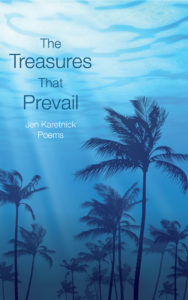Review by Barbara Harroun
– On encountering the hurricane-force voice of The Treasures That Prevail’s opening poem, “Miami as the Narrator of the Next Great American Novel: A Personetelle,” I knew I was going to dive deeply, coming up for air only when necessary. The collection’s title is drawn from Adrienne Rich’s “Diving Into the Wreck,” and Jen Karetnick turns a steely, unflinching eye toward the wrecks we are complicit in creating: in the environments of the land we inhabit, in the relationships we cultivate, and in the places we make our homes—both those we are unwilling to ever leave and those we are forced to flee. Miami is the eye of the storm, and Miami speaks in the opening pages, foreshadowing the journey we embark upon as readers:
I will run this story like a country of my own
making, play with its characters like a child
with grapes, change settings from key to mainland
.…
I will run this story like a country of my own
and the plot will conflict with itself, man versus
hurricane, man versus not the heat but what is
the humidity. It won’t all make sense when done. (13)
As an entire collection, rest assured, it does make sense. Karetnick is an accomplished writer rooted in Miami Shores along with fourteen mango trees “on the last remaining acre of an historic mango plantation” that she shares with her family. (https://whitepointpress.com/our-authors/jen-karetnick/) She’s intimately familiar with the land she renders so viscerally, as well as with its food. She’s authored several cookbooks, including a prizewinning one centered on the mangos (aptly entitled Mango) she harvests each year. Creative Writing Director for Miami Arts Charter School where she teaches 6th—12th graders, Karetnick is also a dining critic, a blogger for Virgin Atlantic Airlines, and a lifestyle journalist. She has an M.F.A. in poetry (University of California, Irvine) and a one in Fiction (University of Miami), and her work has appeared in a myriad of journals. She has won two Dorothy Sargent Rosenberg prizes for a lyric poem, a 2011 Piccolo in Your Pocket competition from the Alaska Flute Studies Center for “Repeat Ad Libitum.” In January, she was awarded the Anna Davidson Rosenberg Poetry Award for her poem “I’m Nothing Without Blood.” She is the author of four poetry chapbooks and three full-length collections, including most recently American Sentencing (Winter Goose Publishing, May 2016). Karetnick’s range and wealth of subject matter is humbling and inspiring, as is her willingness to play with form and poetic traditions. This collection encompasses found poetry from various newspapers, a newsletter, postcards, proverbs, poems, cookbooks, novels, and “terrorist threats heard from various news outlets” (86). “Dear YKW” threads texting terminology throughout. It is clear that Karetnick is living and reading as widely as she is writing.
Separated into three sections, the collection is punctuated with delicious diction and shot through with imagery that cuts to the bone and form that marries content. It speaks to the complexity of modern life. The poems are narrated by two women who are married and mothering two teenage children and who build a stilt house. The house becomes their ark after a storm everyone saw coming, but no one seemed to plan for. The collection hits its highest emotional velocity in the third section as this couple navigates new terrain—wind blown and sandblasted, ravaged by flooding and transformed by loss. The ocean is personified in “Boyish Pursuits”:
The ocean is a junkyard of sheet metal
with headlight eyes and grillwork teeth,
wave after rusted wave dragging hood
emblems and hubcaps to and from the beach
like so many sand dollars and horseshoe crabs. (97)
The narrators are also being transfigured from their previous spa-going, manicured, texting selves:
Day after day, we burn
Emersonian
into our most reliant
sweat-selves:
shadows like pillars
made of salt. (93)
These are women who come to know “[a]s in any catastrophe there are treasures/to be rolled from the lifeless hulks, /and we are the grave robbers who prefer/the here and now over the hereafter, /driving however we can our own destiny” (97).
In witnessing these women’s shared journey of survival, it is impossible for us not to reflect personally on what we can live with, and what we can’t live without—and how we ourselves can go about “holding on/to nothing too dear/too dearly” (84). This collection is worth holding onto, and Jen Karetnick’s work is definitely worth seeking out.
The Treasures That Prevail
by Jen Karetnick
Whitepoint Press, September 2016, $15.00, [Paper]
ISBN 978-1-944856-03-8 86 pp
Barbara Harroun is an Assistant Professor at Western Illinois University. Her most recent work is forthcoming or appearing in Fiction Southeast, Watershed Review, Rappahannock Review and Iron Horse Literary Review. Her favorite creative endeavors are her awesome kids, Annaleigh and Jack. When she isn’t writing, reading, or teaching, she can be found walking her beloved dog, Banjo, or engaging in literacy activism and radical optimism. She can be found at barbaraharroun.com.


